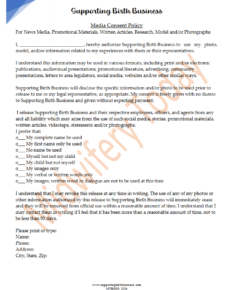
Papatoto: Homebirth from a Father’s Perspective
Editor’s note: This article first appeared in Midwifery Today, Issue 58, Summer 2001.
Subscribe to Midwifery Today Magazine
I’ve always been sort of a “guy’s guy,” steering my life with my will, and often only feel my true feelings later. Even now, more than a month after the birth of our daughter, I still feel as if I’m awakening from a yearlong dream.
As far back as I remember, I assumed I would one day have children. My biggest worry around childbirth was that I wouldn’t be adequately present for my wife Mia during pregnancy and delivery. Male friends had warned me that the moment of birth was terrifying—that even though everything was fine, they’d feared the worst. I worried that I wouldn’t know how to be both reliable (even heroic, if the situation called for it) and at the same time remain vulnerable and nurturing to my wife—visibly so, no less. Bottom line, I feared that I’d not be caring enough, not worthy of fatherhood.
At the outset of our midwife visits—by Jill, our midwife, and her assistants, Angel and Meleah—my hidden apprehension only got stronger. It seemed that the women—Mia particularly—were already relating to this pea-sized fetus deeply and personally. There they would be, three birth specialists, sitting Indian-style around my prone wife, massaging her, testing her, reassuring her, while I had no instinctive sense how to participate. To me, Mia had a “condition”—an exciting and potentially miraculous condition, yes, but a condition just the same.
Months and more visits passed, and I tried to give myself permission to feel whatever I felt. It was all good. By this time we’d found out that we were having a girl, and we’d even chosen a name: “Macy.” Still, I wasn’t getting any real hits of her as a spirit, as the women were, nor was I able to feel how she would affect our lives. Interestingly, the reality came to me, not when I was trying (listening to her heartbeat, or when one of the women took my hand and laid it on Mia’s belly to feel a particular body part), but when I was simply looking on. I liked seeing the women tending Mia, and as I saw her become more comfortable with them, I gradually, unexpectedly, came to revel in those visits and look forward to them.
A turning point came when I attended one of our birth classes without Mia. Actually, Mia and I had had a major argument, and I’d jumped into my pickup and peeled off for the class, to somehow be dutiful. When Mia didn’t show up, there I was—stuck. During this particular class we had baby dolls to diaper. I had never attempted this, and was surprised at how snug my little girl doll felt in the crook of my arm (football position, I was told). This blinking doll immediately seemed like more than a toy. I even felt like she needed changing. Before receiving instructions, I found myself plunging ahead trying to change her. Then, hidden in the layers, I came upon the ricotta cheese and let out a scream. Everyone laughed. But something had begun to take hold in me. I didn’t so much feel foolish, as defiantly eager and protective. When all the dolls had been returned to their box, I was still cradling mine.
Our due date came and went. Mia and I had steadfastly hoped that Macy would come early —so by this time we were anxious and oddly bored. I got “the beep” from Mia on the evening of March 3rd, as I was returning from the dentist, my face drooping from Novocaine. I sped home and leapt into action—pulling the hot tub inside, setting up candles, locating the birthkit, etc.—and in the process, almost forgot about Mia. She was sitting there on the couch—part matriarch, part worried little girl—unwilling to call our team for fear that they’d have nothing to do.
Contractions didn’t start for real for another couple of hours. By that time the whole team, including Meleah’s husband/my friend, Jim, had arrived. The hot tub was ready and Mia had climbed into it, still fully intending to have a waterbirth. Everyone was monitoring the situation in his or her own way. At intervals, Mia had begun to wail at the intensifying pain. As she looked into my eyes and gripped my forearms over the rim of the tub, the intimacy we too often glossed over came into focus. I felt my eyes welling up. Then she burst into tears. “No, no. Too much,” she cautioned. But it was a riveting moment, a moment when my bond with Mia—and the fear and courage running through her—were more real to me than any thoughts of a baby-on-the-way. In that moment I first felt how vital I was to the whole process, how, even with the powerful support around us, the strength to carry us through would come from each other.
Mia became demanding. “I want more smoothie … get me more smoothie!” she yelled upstairs to Jim. “Michael, UP HERE, MY SHOULDERS!” Usually, Mia is the one who is attentive to others. This was a shift; we were there for her. She was in charge. Only at key moments did Jill step in firmly, coaching Mia on how to move through the sudden bursts of pain without losing energy. Jill coached her not to push yet. Mia’s screams grew ferocious. Those extra micro-centimeters of dilation seemed to take forever, although, in fact, the birth was progressing rapidly. At some point during the blurry progress of things, it became clear that we were going to have to leave the tub; that there was a slight excess of blood, which needed to be monitored with towels. We shifted to the futon. I didn’t show it, but the escalation of volume, frenzy, sweat and blood was getting to me a little as I clutched Mia, trying to reassure her through each strengthening contraction. Angel’s or Meleah’s touch on my shoulder told me I was doing fine. One of them would mop Mia’s brow with a washrag dipped in lavender-scented water, then they would mop mine too.
Then came the first truer sign of complication. The blood being blotted up by towels became even thicker. Macy’s heartbeats were sounding erratic, and for long moments, were hard to pick up at all. They were faint one second, then racing. My own heart beat in my throat as I struggled with how much suddenly hung in the balance. I could lose them both! Jill told Mia to stay where she was on the futon and breathe deeply. I used all my street skills trying to read Jill’s poker face. I couldn’t.
When Jill told Angel to go for the phone I saw it as a drastic sign. Adrenaline flooded my body. I wanted to slay some foe, but had no clue where or what it was. (Only later did I learn that there had been a partial abruption.) We hung on and waited. Macy’s heartbeats carried on unpredictably. Then the bleeding came under control, and as we listened, Macy’s little heartbeats evened and held their strength.
Suddenly Mia gripped hard on my forearms as I held her from behind. She was bearing down with all her might. Angel grabbed an old antique hand mirror and tried to angle it up from below so I could see where the gleaming white head was appearing and disappearing. I shifted my gaze to Jim, who stood by, his wide-open stare teetering between awe and horror. My face exactly!
Macy became real to me, as Macy, at exactly the moment she slithered out, came up Mia’s stomach, and—still very much attached by a wildly pulsating umbilical cord—let out a kind of coo. There she was, glisteningly alive and startlingly beautiful. There we were, pawing at her slick little body, doing our best to nestle her, looking on as her tiny eyes struggled open and her small fingers reached out to clasp one of my own.
It was as if all my circuit breakers flipped. Yet, in a way, I was fully present. In response to some of those warnings from male friends, I’d prepared myself for the stark look of birth—the clammy coating, the rashes and forehead hair, the lopsided head, the looking-dead—I’d even saved, and more or less memorized, a handout listing all these possibilities; but there had been no need for any of that. This birth had come as a huge, beautiful gift that we somehow had earned. Exhausted, Mia and Macy and I fell asleep on the birth couch as rain began pattering on the roof. Jill and Angel and Meleah stayed, talking and cleaning up, and were there again when we woke.
Days later, when the photos arrived, I opened them, eager to make sense of that heightened moment. I couldn’t believe my eyes—there, coming out, Macy’s skin was a deep shade of blue, her face smeared with blood, her expression tortured! I was truly shocked. How had I remembered her entry into the world as being so smooth and clean, despite my hidden apprehensions and those anxious warnings from male friends?
It could only be that by being with the three women while receiving Macy into this world, I had been subtly convinced to see with their calm wisdom—not afraid, but aware of the full, hands on, eternal beauty I was participating in. Everything was fine, despite what the clinical pictures show. Isn’t this the stuff of myth—to remember events based on how we feel about them? This was the myth bestowed upon me—which now informed my memory.
On my own, I might not have seen beyond what the pictures showed. If it had been a hospital birth, if I hadn’t been guided by our midwives from the earliest months all the way through to the end—I could have missed the chance to feel that deep connection. I would have seen only through the literal eye of the camera, and there would have lain my myth as well.





















